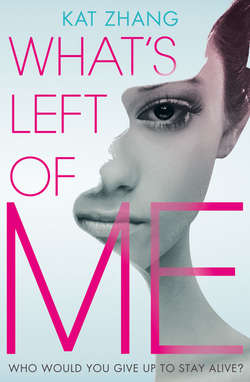Читать книгу What’s Left of Me - Kat Zhang - Страница 13
Оглавление
he days passed. Then a week. Then another and another. I used to count my life in weekends or theater visits or Lyle’s dialysis sessions. I marked the days with school assignments or babysitting jobs. Now I tallied my life by the improvements I made lying on a couch with Ryan or Devon, Hally or Lissa, by my side. The number of words I managed to speak. The fingers I managed to move.
And for the first time, my mind filled with memories that were mine and mine alone. My first smile while Hally whispered to me all the stupid, crazy things she’d dragged her brother into when they were little. My first laugh, which startled Lissa so much that she’d jerked away before laughing, too. And even on the days when all my progress seemed to backslide and I lay mute and paralyzed on the couch, trapped in the darkness behind our eyelids, I had someone beside me, talking to me, telling me stories.
I learned how the Mullan family had moved to Lupside a year before Addie and I did, when their mother had changed jobs. How Ryan missed their old house because he’d spent twelve years there, had known the position of every book in the library, the creak of every step in the curved stairwell. How Hally didn’t miss it because they’d hardly had any neighbors, and the ones they did have had been hateful. How they both had fond memories, though, of the fields behind the house and childhoods spent running through them, pretending to be anywhere but where they actually were.
I remember with perfect clarity the first time I opened our eyes.
Hally had screamed, then scrambled to fetch Devon. “Look!” she’d cried. “Look!”
“Eva?” Devon had said. But it hadn’t been Devon.
That was the first time I caught them shifting, caught Ryan pushing through and looking out at me. I couldn’t even move our gaze or smile or laugh, could only stare up at his face. He was so close that I could pick out his individual eyelashes, long and dark and curved like Hally’s.
I remember that snapshot of him, smiling with only one side of his mouth, hair damp and curlier than normal from that afternoon’s rain. It was my first glimpse of him, really, because we hardly ever saw him at school, and even when we did, Devon always seemed to be in control. He rolled his eyes slightly as Hally nudged him aside so I was looking at her instead.
“Soon,” Hally said, grinning, “you’ll be doing cartwheels.”
At times like that, I believed her. Other times, I wasn’t so sure.
“Don’t worry about it,” Ryan said one afternoon. Hally and Lissa were gone again that day. They seemed to be leaving us with Ryan more and more now, and Addie had stopped asking where they went. I didn’t mind. I liked this boy who pulled up a chair next to the couch, who talked to me about wiring and voltage and then laughed and said I was probably bored out of my mind, that this was all incentive for me to get control of my legs so I could escape.
<What if the control never comes back?> I said. I talked to him and Lissa like this a lot now, knowing they couldn’t hear me but speaking anyway. Sometimes they carried on one-sided conversations for up to an hour. The least I could do in return was speak to them, even if they didn’t know it.
Ryan pulled his chair closer. “Devon and I never really settled. There were a few months when we were five or six when I kept losing strength. Everyone was sure I’d be gone by our seventh birthday.” His lips twitched into a smile. “But I came back. I don’t know how, exactly. I remember fighting it, Devon fighting it … and I don’t know. Our parents never told anyone. You remember our mom works at the hospital?”
I did. That was where the medicine came from—stolen one day when Hally had gone with her mother to work. Addie had barely kept from shuddering when she’d learned.
“She knows a bit about this kind of stuff. She thought maybe we were just late bloomers or something. Or she hoped, anyway. So she never reported it, and she made sure we hid it—she hid us. Donvale—that’s where we lived before—is this tiny, rural place, so it was easier to keep to ourselves. Our dad homeschooled us through first and second grade so we wouldn’t be in public so much during that time, when every-one’s newly settled. Our parents were afraid, you know?”
It took all my strength—all my strength and all my concentration—but I managed to force our lips, our tongue, to form one word: “Yes.” And in that one word, I tried to convey everything.
Ryan smiled, like he always did when I spoke, even when it was just a few syllables. But then his smile faded. “The officials wouldn’t have been lenient about the deadline—not with us.”
I was torn between horror and envy. If you knew your child was sick, wasn’t developing naturally, how could you not take him to the doctor? How could you not worry?
“But eventually, not going to regular school was attracting more attention than it was worth. Our mom thought Devon showed signs of being dominant, so when she finally registered us, she put only his name. Just pretend, she told us. We’d already learned how important it was that we did.”
